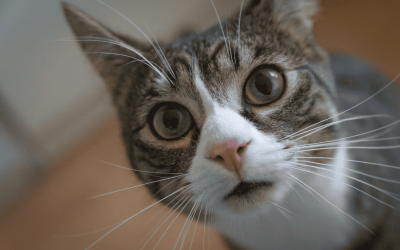Cats try to be dignified creatures at all times, even if head butting you and occasionally making fools of themselves over a laser pointer. So cats will often try to hide illness. Cats are hardcoded by genetics to mask when they are ill so as to be safe from other predatory animals. It can be hard always to tell when your cat is unwell but here are some behavioral changes that indicate a cat might be sick. Often a cat will show behavioral symptoms before physical signs of illness so by knowing your cat’s normal behavior and quirks; you can be an awesome cat mom or dad by taking your cat to the vet if you notice any of the things in this guide to the behaviors of sick cats.
Increase in Appetite
The majority of people worry when their cat loses appetite and interest in food but if a cat that normally eats well suddenly becomes the voracious eating machine and has an increase in appetite can also have a health issue. Any sudden appetite change that lasts more than a day or two should encourage a vet visit. Underlying health problems can affect a feline appetite. Increased appetite is usually caused by an endocrine disorder like hypothyroidism or diabetes. Hyperthyroidism, nutrient malabsorption, and intestinal issues can also cause a cat to intake more food to deal with the digestive or endocrine imbalance.
Heavy Kitty Drinking
Cats are not anything like dogs when it comes to regularly drinking water, and many cats often hover right above dehydration. Cats do need ample fresh water, a cat that seems always to be thirsty and is drinking far more than normal could have a serious health issue like Kidney disease or an endocrine condition like the ones in the previous example.
The Foulest Mouth
While a cat with diabetes may have sweet breath that smells sickly sweet and a bit like juicy fruit gum due to ketones, a cat with the foulest breath in a cat could have a health issue. We’re not discussing the normal tuna breath; we’re discussing genuinely bad breath. By age three, 85% of all cats have periodontal disease, and bad breath is a symptom. Having your cat suffer the indignity of regular dental care and cleaning their pearly white incisors cleaned yearly. As well as discussing dental hygiene for cats at your yearly kitty wellness visits at the vet. Kidney disease prevents a cat from filtering out waste products, so a cat with ammonia breath needs urgent medical care. Tuna breath is normal; anything else can be a symptom worth following up with a vet.
Abnormal Bad Hair Days
If your cat normally has a fastidious groomer and enjoys cleaning their coat but suddenly stops grooming and has matted hair and is not doing the normal cat self-care thing, it can be a behavior of a sick cat. Obese cats can have trouble grooming but so can cats with dental issues, arthritis pain, and other issues. A fat cat can be cute, but obesity also places your beloved kitty at serious health risk and can decrease their quality of life and life span. Old age can also cause changes in grooming but a healthy cat will groom itself, and if your cat is not cleaning itself, it should be taken to the vet to get treatment and care.
Excessive Vocalizing
Meowing is how cats sometimes choose to communicate with us humans that are their parents. But if your cat is suddenly is meowing, meeping and vocalizing abnormally, your cat may be telling you she or he doesn’t feel well and be asking for help. Not all cats are talkers so if you’re typically barely vocal cat is meowing constantly and not being it’s normal self- your cat could be in pain or ill. Likewise, a cat that always has something to say to their people that suddenly can’t even mew to acknowledge you, you might be concerned. Any sudden changes in a cat vocalization or tone of voice becoming plaintive and insistent can indicate a behavioral change that deserves paying attention to.
Litter Box Behavior Changes
Some cats occasionally will stop using the litter box for medical issues as well as a reaction to stress. Cats can have stress and stop using the cat box. New litter, changes in the environment, emotional issues and feeling neglected, all of these can effect your cat’s toilet habits. Many physical health problems such as UTIs, cystitis, arthritis and other physical health issues can cause a cat to have problems using the litter box. Sudden litter box habit changes and refusal to use it require a vet visit to see if it’s a medical problem or a mental health issue.
Always Hiding
In the wild, a sick or weak cat will hide for their safety. A housecat is still a cat, and so sometimes a sick cat will decide to go under the bed and will not come out, even for a drumstick. Another theory as to why cats that are sick hide is because they want to be left alone and want a safe, quiet place to sleep and recover. However, hiding can be a sign of stress, anxiety, fear or injury. If a cat breaks its leg, it may hide and suffer in secrecy. While all cats need alone time, if your cat recently had trauma and is in hiding or begins hiding for long periods of time and has a change is social habits, along with other behavioral changes, it’s time to go to the vet to make sure your cat is ok.
Cats Eye Abnormalities
Cat eyes are very reactive to changes in light, but if you notice your cats pupils not matching or dilating randomly when there’s no change in brightness, it can be a sign of a neurological or brain issue. Discharge, drooping eyes and changes to the cat’s nictitating third eyelid that covers their eyes along with a lethargic and non-eating cat require a vet visit. These signs certainly indicate a sick pet cat that needs prompt medical care.
Bad Cattitude and Lethargy
If your cat is normally a sweetheart and has suddenly become mean, antisocial and is behaving oddly, your cat may be ill. Irritability and crankiness can be signs of pain and senility in an older cat. Cats with joint or back pain will react with aggression if touched in an area of pain. If your cat suddenly has a personality change and seems unusually irritable, it could be a sign your cat is sick.
Another thing to look for is a normally affectionate or playful cat just wanting to lie around and be alone. If there have been no changes in the home and your cat is listless, lethargic and disinterested in being active or playing with even favorite toys, they may not be feeling well. A cat may also not be interested in playing if their mental health is not well. A new baby in the house, moving, or strangers coming over can also stress a cat out and make them not want to play with their favorite catnip-stuffed mice. If the stress does not resolve in a week or two, a vet visit for mental health can help your cat get treatment and be their playful, happy selves again.





Recent Comments